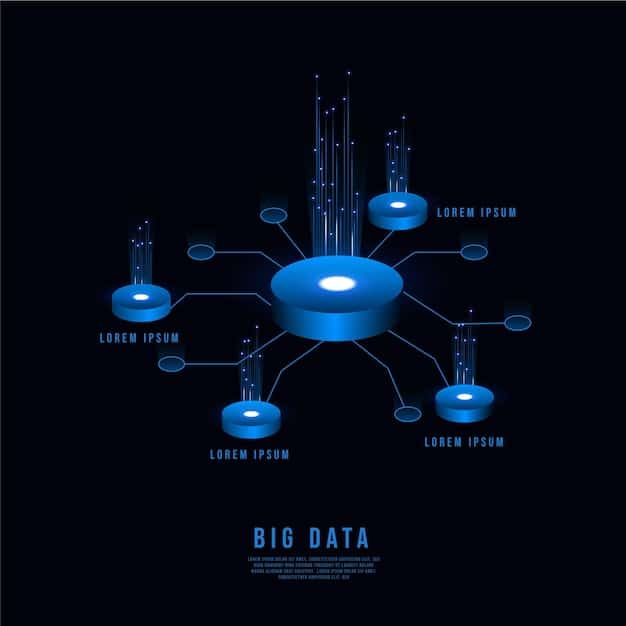Web3 Identity: How Self-Sovereign Identity Secures US Data by 2025

Web3 identity solutions, particularly self-sovereign identity (SSI), offer a transformative approach to data privacy for US users by enabling them to control their personal data and share it selectively, potentially mitigating risks associated with centralized data storage by the end of 2025.
The advent of Web3 promises a decentralized and user-centric internet, but data privacy remains a critical concern, especially for users in the US. Web3 Identity Solutions: How Can Self-Sovereign Identity Improve Data Privacy for US Users by the End of 2025? is a rapidly developing area that aims to address these concerns.
Understanding the Need for Enhanced Data Privacy in the US
Data privacy has become a paramount concern for individuals and organizations alike in the United States. With increasing instances of data breaches, identity theft, and misuse of personal information, the need for robust data protection measures has never been more critical. Current centralized systems often fail to provide adequate security, making users vulnerable to various privacy risks.
The Current State of Data Privacy in the US
The US currently relies on a patchwork of federal and state laws to govern data privacy. While some regulations like HIPAA and CCPA offer specific protections, a comprehensive federal law is still lacking. This fragmented approach leaves many gaps, making it difficult for individuals to understand their rights and for businesses to navigate the complex legal landscape.
Challenges with Centralized Data Systems
Centralized data systems, where large corporations store vast amounts of user data, pose significant privacy risks. These systems are attractive targets for hackers, and data breaches can expose sensitive information to malicious actors. Moreover, users often have limited control over how their data is collected, used, and shared.
- Data breaches and cyberattacks are increasingly common, leading to the exposure of personal information.
- Lack of transparency in data collection and usage practices.
- Limited user control over their data and how it is shared.
- Regulatory gaps and inconsistencies in data privacy laws.
The existing data privacy landscape in the US highlights the urgent need for innovative solutions that empower users and enhance data protection. Web3 identity solutions, particularly self-sovereign identity, offer a promising path forward.

What is Self-Sovereign Identity (SSI) and How Does it Work?
Self-Sovereign Identity (SSI) is a revolutionary concept that puts individuals in control of their digital identities. Unlike traditional identity systems where data is stored and managed by central authorities, SSI empowers users to create, own, and manage their own identity credentials. This approach offers significant advantages in terms of privacy, security, and user autonomy.
Key Principles of Self-Sovereign Identity
SSI is based on several core principles that distinguish it from traditional identity systems. These principles include user control, portability, privacy, and security. By adhering to these principles, SSI aims to create a more trustworthy and user-centric digital identity ecosystem.
How SSI Empowers Users
SSI empowers users by giving them direct control over their personal data. Users can decide what information to share, with whom, and for what purpose. This level of control reduces the risk of data breaches and misuse, as users are not reliant on centralized authorities to protect their data.
- Users create and own their digital identities, independent of central authorities.
- Users control what information they share and with whom.
- SSI enhances privacy by minimizing the amount of data shared and stored in centralized systems.
- SSI improves security by reducing the risk of data breaches and identity theft.
Self-Sovereign Identity offers a paradigm shift in how we manage digital identities, providing a foundation for enhanced data privacy and user empowerment. Its decentralized nature and user-centric design make it a promising solution for addressing the challenges of data privacy in the US.
The Role of Web3 Technology in Enabling SSI
Web3 technologies, such as blockchain, decentralized storage, and cryptography, play a crucial role in enabling self-sovereign identity. These technologies provide the infrastructure and tools necessary to create secure, private, and user-controlled identity systems. By leveraging Web3, SSI solutions can overcome the limitations of traditional identity systems and offer a more trustworthy and robust approach to data privacy.
Blockchain and Decentralized Ledgers
Blockchain technology provides a secure and immutable record of identity transactions. Decentralized ledgers ensure that identity data is not stored in a single location, reducing the risk of centralized data breaches. Blockchain also enables verifiable credentials, allowing users to prove their identity without revealing unnecessary personal information.
Decentralized Storage Solutions
Decentralized storage solutions, such as IPFS, allow users to store their identity data in a distributed manner, further enhancing privacy and security. By avoiding centralized storage, users can reduce the risk of data breaches and ensure that their data is always accessible.

Cryptography and Secure Data Handling
Cryptography is essential for securing identity data and ensuring that only authorized parties can access it. Encryption, digital signatures, and zero-knowledge proofs are used to protect sensitive information and enable secure and private identity interactions.
Web3 technologies provide the building blocks for creating self-sovereign identity systems that prioritize user control, privacy, and security. By combining these technologies, SSI solutions can offer a more trustworthy and user-centric approach to data privacy in the US.
Benefits of SSI for US Users by the End of 2025
The adoption of Self-Sovereign Identity (SSI) by the end of 2025 could bring numerous benefits to US users, enhancing data privacy, security, and control over their personal information. As more businesses and organizations embrace SSI, individuals will experience a more seamless and secure digital identity ecosystem.
Enhanced Data Privacy and Security
SSI empowers users to control what information they share and with whom, reducing the risk of data breaches and misuse. By minimizing the amount of data stored in centralized systems, SSI enhances privacy and security for US users.
Increased Control Over Personal Data
SSI gives individuals the ability to manage their own identity credentials and decide how their data is used. This increased control allows users to participate in the digital economy with greater confidence and autonomy.
- Reduced risk of identity theft and fraud.
- Greater transparency in data collection and usage practices.
- Seamless and secure access to online services.
- Compliance with data privacy regulations like GDPR and CCPA.
The benefits of SSI extend beyond individual users, as businesses and organizations can also benefit from improved data security, reduced compliance costs, and enhanced trust with their customers. By adopting SSI, the US can create a more secure and user-centric digital identity ecosystem.
Challenges and Obstacles to SSI Adoption in the US
Despite the numerous benefits of Self-Sovereign Identity (SSI), several challenges and obstacles could hinder its widespread adoption in the US by the end of 2025. Addressing these challenges is crucial for unlocking the full potential of SSI and ensuring its successful implementation.
Lack of Awareness and Understanding
Many users and organizations in the US are still unaware of the benefits of SSI and how it works. Lack of awareness can lead to skepticism and resistance to adopting new identity solutions. Educational initiatives and public awareness campaigns are needed to promote the understanding and adoption of SSI.
Regulatory and Legal Uncertainties
The regulatory and legal landscape surrounding digital identity is still evolving in the US. Uncertainties about the legal status of SSI and its compliance with existing data privacy laws can create barriers to adoption. Clear and consistent regulations are needed to provide a legal framework for SSI and encourage its use.
Interoperability and Standardization Issues
Lack of interoperability between different SSI systems and platforms can limit their usefulness and create confusion for users. Standardization efforts are needed to ensure that SSI solutions can work together seamlessly and that users can easily transfer their identity credentials between different systems.
Overcoming these challenges will require collaboration between industry stakeholders, government agencies, and standards organizations. By addressing these obstacles, the US can accelerate the adoption of SSI and realize its full potential for enhancing data privacy and user empowerment.
Future Trends and Predictions for Web3 Identity Solutions
The future of Web3 identity solutions looks promising, with several trends and predictions shaping the evolution of Self-Sovereign Identity (SSI) in the coming years. As technology advances and adoption increases, SSI is expected to become an integral part of the digital identity landscape in the US and beyond.
Increased Adoption of SSI by Businesses and Organizations
More businesses and organizations are expected to adopt SSI to improve data security, reduce compliance costs, and enhance trust with their customers. As the benefits of SSI become more apparent, adoption is likely to accelerate across various industries and sectors.
Integration of SSI with Existing Identity Systems
SSI is likely to be integrated with existing identity systems, such as government-issued IDs and corporate credentials, to create a more seamless and user-friendly experience. This integration will allow users to leverage their existing identities while benefiting from the enhanced privacy and security of SSI.
- Advancements in blockchain and decentralized technologies.
- Development of new standards and protocols for SSI.
- Increased user awareness and demand for privacy-enhancing identity solutions.
- Growing recognition of the economic and social benefits of SSI.
The future of Web3 identity solutions is bright, with SSI poised to transform the way we manage digital identities and protect personal data. By embracing SSI, the US can create a more secure, private, and user-centric digital identity ecosystem for the benefit of all.
| Key Point | Brief Description |
|---|---|
| 🔑 SSI Principles | User control, portability, privacy, and security are core to SSI. |
| 🛡️ Web3 Tech | Blockchain, decentralized storage, and cryptography enable SSI. |
| 🚀 US Benefits | Enhanced privacy, control, and compliance for US users. |
| 🚧 Challenges | Awareness, regulations, and interoperability pose hurdles. |
FAQ
▼
Web3 identity refers to decentralized digital identity solutions that leverage blockchain and other Web3 technologies to give users greater control over their personal data and online interactions.
▼
SSI empowers users to create, own, and control their digital identities independently of central authorities. Users can selectively share verified credentials with relying parties, enhancing privacy and security.
▼
SSI offers US users enhanced data privacy, increased control over personal data, reduced risk of identity theft, and seamless access to online services while complying with data privacy regulations.
▼
The challenges include lack of awareness, regulatory uncertainties, and interoperability issues. Overcoming these hurdles requires collaboration between industry, government, and standards organizations.
▼
Businesses should educate themselves about SSI, explore pilot projects, engage with standards organizations, and collaborate with technology providers to integrate SSI into their existing systems.
Conclusion
As we look towards the end of 2025, Web3 identity solutions, particularly self-sovereign identity, hold significant promise for enhancing data privacy for US users. By embracing these technologies, individuals can regain control over their personal data, and organizations can build more trustworthy and secure digital relationships.





